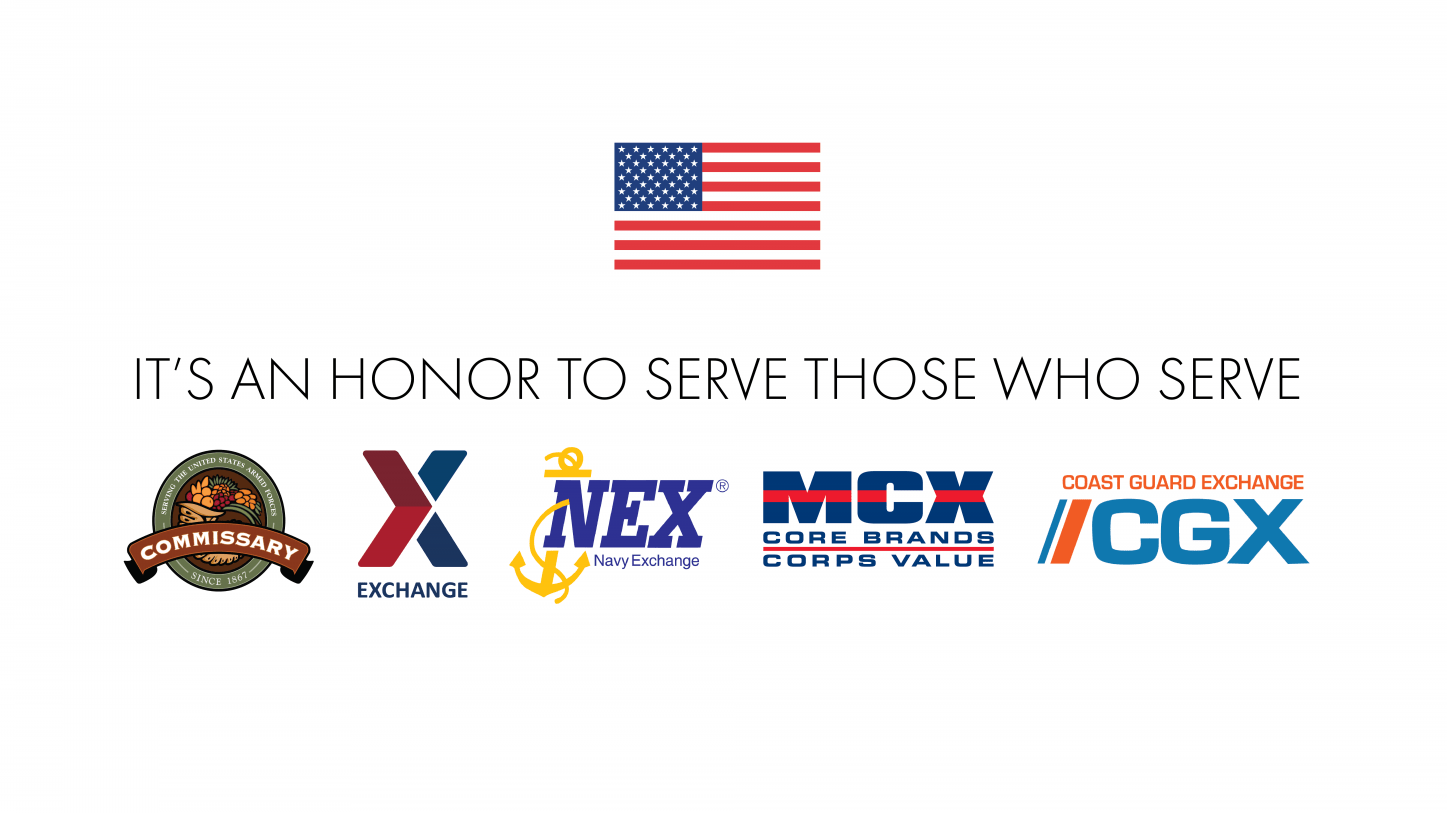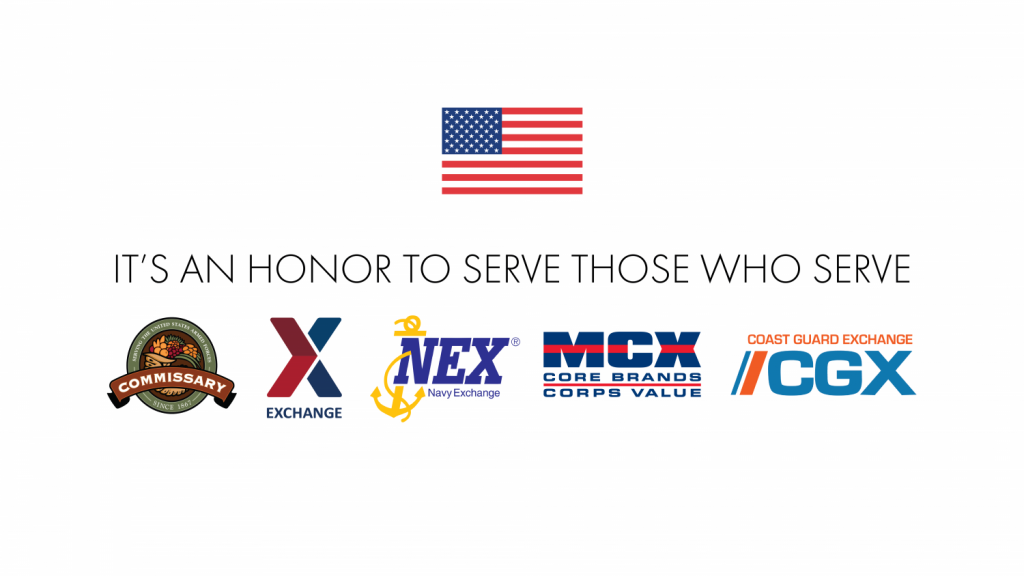Military Resale Unites to Support Service Members During COVID-19 Pandemic

 During the unprecedented COVID-19 pandemic, the military resale community stands united in its commitment to support service members and families who rely on exchanges and commissaries for goods and services. (Watch now: collaborative COVID-19 response).
During the unprecedented COVID-19 pandemic, the military resale community stands united in its commitment to support service members and families who rely on exchanges and commissaries for goods and services. (Watch now: collaborative COVID-19 response).
Around the world, the Army & Air Force Exchange Service (AAFES), Navy Exchange Service Command (NEXCOM), Marine Corps Exchange (MCX) and Coast Guard Exchange (CGX) are mission essential, while the Defense Commissary Agency (DeCA) is mission critical.
All told, military resale supports Warfighters and their families with 300 main exchanges, 236 commissaries (more than 6,700 facilities) in nearly 40 countries.
The joint buying alliance, signed in early 2019, has enabled exchanges and commissaries to significantly increase orders for high demand items, such as cleaning and hygiene products, during the pandemic by sharing sources and leads for constrained products.
Additional recent protective measures instituted by military resale to keep communities safe include:
- Cleaning and disinfecting stores and restaurants.
- Reducing/changing hours for thorough cleaning and restocking.
- Deploying signs to remind shoppers of physical distancing guidelines, and in many cases, marking the floor to ensure shoppers keep 6 feet of distance while waiting in line.
- Serving grab-and-go meals to military children engaging in virtual learning in South Korea, Japan, Okinawa, Europe and Guantanamo Bay. More than 10,000 meals have been served during the pandemic.
- Encouraging “cashless” transactions.
- Canceling special in-store events to reduce crowds.
- Working with MILITARY STAR® cardholders individually on hardships. Cardholders can email militarystar@aafes.com for information.
“AAFES is fully nested with installation commands to ensure alignment with the Army and Air Force missions,” said AAFES Director/CEO Tom Shull. “Our team stands with military families around the world during this challenging time. Never has the benefit we are honored to provide Soldiers and Airmen been such a force multiplier in protecting the force.”
During the pandemic, AAFES is:
- Deploying mobile field Exchanges (MFEs), including a 53-foot store on wheels at the Army field hospital at the Javits Center in New York City to support 3rd Expeditionary Sustainment Command Soldiers, National Guard members and civilian medical personnel. Two additional MFEs are also operating at Joint Base San Antonio-Fort Sam Houston and Fort Benning.
- Distributing face masks for customer-facing and distribution center associates.
- Installing acrylic shields at points of sale and customer service areas.
- Offering buy online, pick up in store service.
- Piloting curbside pickup.
- Instituting personal shopping for quarantined Soldiers and Airmen.
- Offering takeout service at restaurants.
- Discontinuing the use of reusable cups at food facilities
- Training food service workers on safety, cleanliness and personal hygiene; reviewing and following food safety and hygiene measures.
- Updating store hours in real-time on ShopMyExchange.com and social media channels.
The Navy Exchange Service Command (NEXCOM) serves the nation’s U.S. Navy Sailors and their families. During times of crisis, its core business lines, including NEX retail stores, Uniform Program Management Office, the Navy Clothing & Textile Research Facility, the NEXConnect Telecommunications Program Office, Ships Store Program and the Navy Lodge Program, all to provide goods and services that directly impact Navy commands, individual Sailor readiness and family morale.
“NEXCOM’s mission is enduring, and remains critical especially during these times of crisis,” said retired Rear Adm. Robert J. Bianchi, CEO of NEXCOM, who is dual-hatted as the DOD special assistant for commissary operations. “Our command is in lockstep with installation and Navy leadership to help serve as a force multiplier and a sustained readiness enabler for our Navy’s warfighters.
“NEXCOM’s 14,000 personnel across our six business lines have been hard at work, around the clock ensuring our Sailors and their families have access to essential goods and services during this worldwide crisis.”
NEXCOM is:
- Providing high-speed personal Wi-Fi connectivity as usage increases as Sailors remain on base or families overseas remain indoors. NEXCOM’s NEXConnect Telecommunications Program Office has worked around the clock to ensure internet connectivity remains steady.
- Maintaining close coordination between its Ships Store Program and Supply Officers onboard all deployed ships by providing necessary merchandise and services. The team has been supporting the USS Theodore Roosevelt (CVN 71) USS Nimitz (CVN 68), USNS Mercy (T-AH 19) and USNS Comfort (T-AH-20).
- Supplying Navy Active Duty and Reservists onboard the USNS Mercy and USNS Comfort with their uniform needs prior to deployment. NEXCOM’s Southeast Distribution Center and uniform team expedited all orders and outfitted the crew with the required uniforms.
- Focusing efforts downrange in overseas locations such as Guam, Jebel Ali and Bahrain to support the Fleet and those Sailors on Restriction of Movement (ROM) by utilizing the NEX Downrange Program and a newly created NEX Quarantine Program, which allows Sailors to order select merchandise and have it delivered to their location.
- Using worldwide Navy Lodges, in conjunction with Navy commands, to house Sailors and families on ROM. As of April 15, there are 23 Navy Lodges with just under 400 rooms being used by Navy commands.
- Feeding Sailors from the USS Theodore Roosevelt (CVN 71) who are currently quarantined ashore.
Marine Corps Community Services (MCCS) is doing its part for its customer base as well.
“Key components of MCCS, such as the Marine Corps Exchange (MCX) and the Inns of the Corps Lodges, continue to be steadfast in their support during the COVID-19 pandemic,” said Marine Corps Business and Support Services Division Director/CEO Cindy Whitman Lacy. “Our MCX buying team, through its relationships with our loyal suppliers, has ensured necessary items remain available,especially for those who are living and working on our installations. We understand the urgency of keeping our community fueled, prepped, and supplied better than anyone.
“In this ever-changing environment and time of constant unpredictability, we aspire for our support to be a stabilizing influence to Marines and their families. Our associates are passionate and committed to keeping clean and safe environments for our customers. They epitomize the term ‘Civilian Marines.’”
MCX is:
- Canceling in-store events that create unsafe gatherings and focusing efforts on the necessities of the current environment and operational mission.
- Provide food by pick up, grab and go, and via unmanned MCX 24’s.
- Maintaining operations at Inns of the Corps Lodging in order to support command-approved occupants.
- Maintaining operations at MCX gas stations.
- Securing additional shipments of sanitation and home necessity items.
CGX is fully engaged with taking care of Coast Guard members.
“CGX associates are working around the clock to keep stores open and sanitized, maintain stocks, and make stores available and safe for authorized patrons,” said CAPT Bruce C. Brown, Commanding Officer of the USCG Community Services Command. “These services and supplies we provide are absolutely mission essential to the men and women who serve both ashore and afloat, given CGX stores’ proximity to Coast Guard installations and Coast Guard families. Additionally, shopCGX.com has proven to be a valued partner to allow our authorized patrons to shop in the safety of their home and receive timely delivery of needed commodities”
CGX is:
- Procuring more than $300,000 in emergency relief, sanitation, and hygiene supplies for the Coast Guard’s Shore Infrastructure Logistics Center and Director of Operational Logistics.
- Supporting Coast Guard Operational Commanders.
- Taking care of our Coast Guard families.
Commissaries are mission critical and have leaned forward to care for service members worldwide.
“We want to reassure our valued customers and our dedicated employees that their health and welfare are our No. 1 concern,” Bianchi said. “Our objective right now is to provide military members and their families with necessary goods and to make sure our stores remain safe and clean.”
Actions taken by the commissaries are:
- Mandating all customers and patrons entering a store wear a face covering for the protection of all.
- Installing plexiglass sneeze shields in all regular checkout lanes to add protection for customers and cashiers.
- Wiping down checkout areas, product display cases, restrooms and shopping carts with disinfectant, and practicing routine hand washing and other basic sanitation measures to avoid spreading germs.
- Enabled touchless credit card processing eliminating the need for the customer to sign.
- Asking customers to scan their own ID cards so cashiers can provide them touchless transactions.
- Securing supplies and personal protective equipment for frontline store employees. The agency is distributing masks and gloves to stores as fast as possible.
- Discontinuing the use of shopper provided reusable bags.
- Allowing only authorized customers – this includes disabled veterans with VHIC cards – will be to enter a commissary. Visitors will no longer be allowed to accompany authorized customers and 100% ID check is in place.
- Using critical hire authority to fast-track the hiring of store employees needed to help keep stores properly staffed.
- Using store discretion in placing item purchase limits necessary to help maintain stock availability.
- Activated its emergency operations center to mobilize the agency’s support to its 236 stores worldwide.
- Supporting agent shopping service at local commissaries where installation leaders establish a process to recruit volunteers and connect them with the customers who need this service.
- Canceling special events, such as the spring sidewalk sales, in-store product demonstrations (including DeCA’s free coffee program), group tours, vendor-sponsored events and Month of the Military Child activities such as the coloring contest in order to discourage group gatherings.
- Working jointly with installation leadership and public health personnel to implement risk reduction practices such as one-way aisles, designated store hours, and limiting the number of patrons in the store.
- Increasing the number of airlifts to supply OCONUS stores, especially in the hardest hit areas.
The military resale family stands with military families. The exchanges and commissaries are all in for those who serve.

